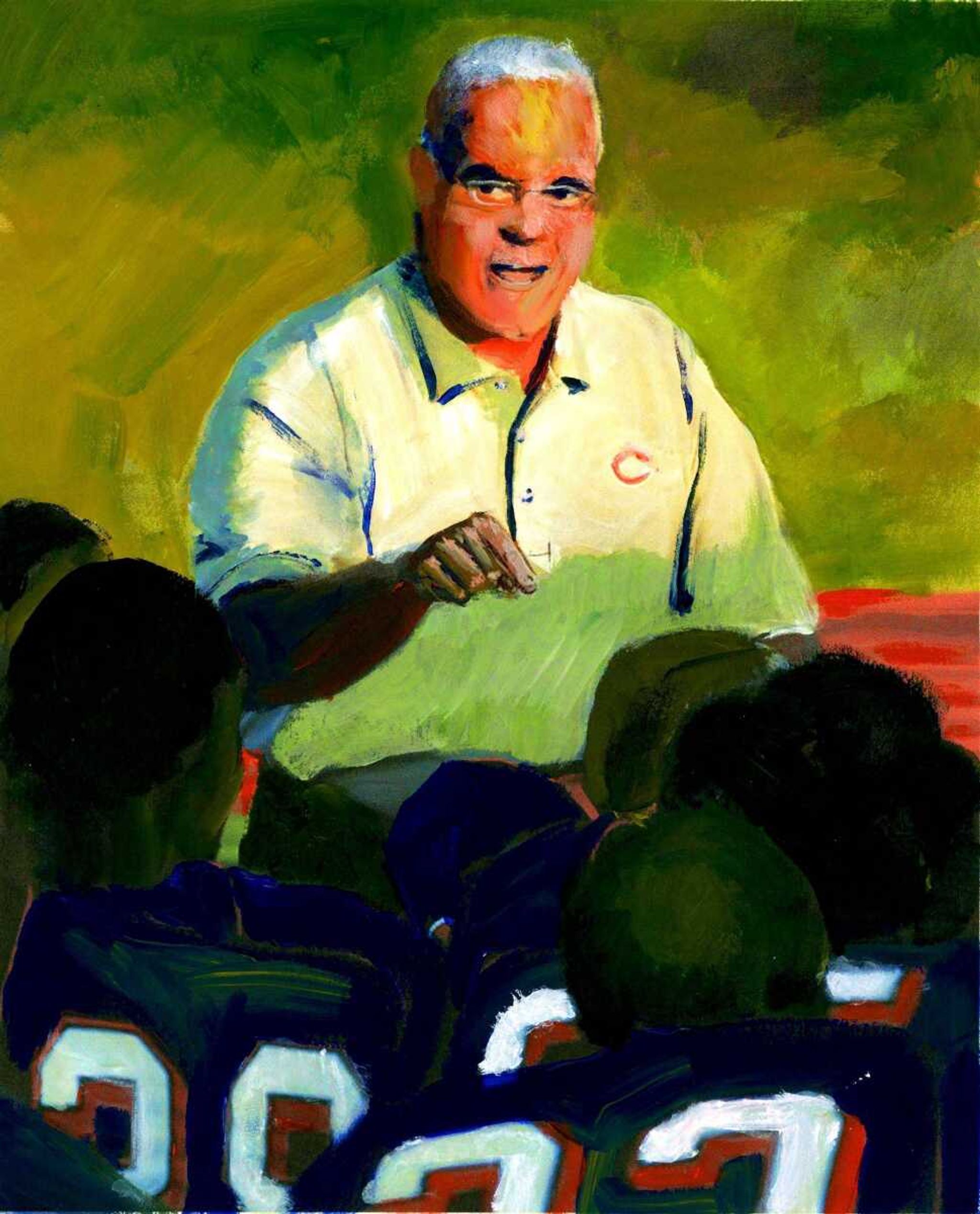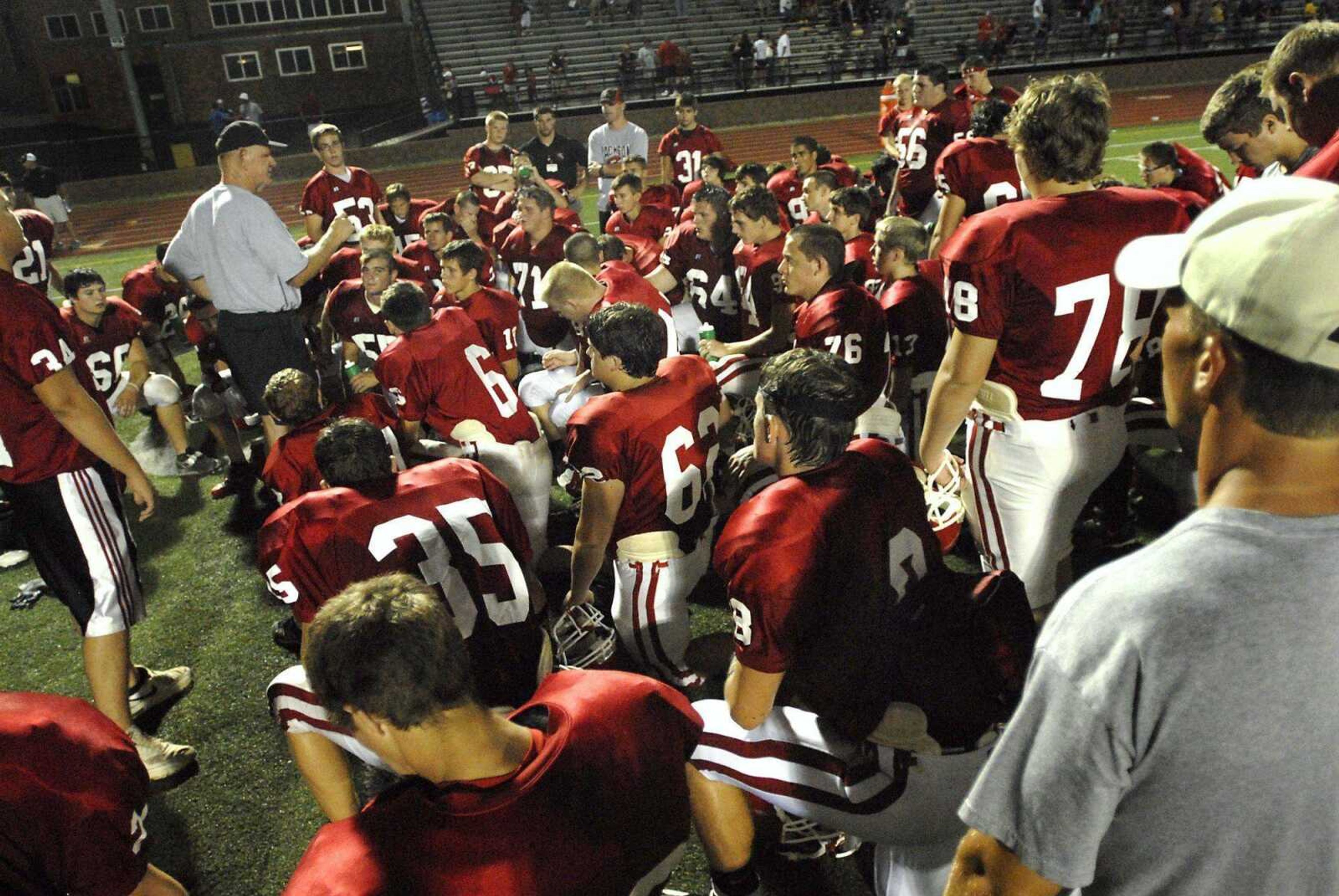Football preview: Pregame speeches set stage for play on the field
A well-delivered speech can provide added intensity and focus, while a poorly designed speech can be detrimental to a team's pschye in the moments leading up to kickoff.
Hollywood set a lofty standard for football coaches with its portrayal of locker room speeches.
There's Pat O'Brien playing Knute Rockne in "Knute Rockne All American," telling his Notre Dame players "sometime, when the team is up against it, and the breaks are beating the boys, tell them to go out there with all they got and win just one for the Gipper."
Or Al Pacino as Tony D'Amato in "Any Given Sunday," encouraging his players that "in any fight, it's the guy who's willing to die who's going to win that inch."

Don't forget about Chelcie Ross as Notre Dame coach Dan Devine in "Rudy," calmly but authoritatively rousing his team with "this is your game now gentlemen, and for you seniors, it's your last one, so make it count because you'll remember it for the rest of your lives. Let's get 'em."
A well-delivered speech can provide added intensity and focus, while a poorly designed speech can be detrimental to a team's pschye in the moments leading up to kickoff. Local football coaches and experts agree that the best approach is to provide a focal point for the players as they prepare to take the field.
"I've heard some good ones and I've heard some bad ones where you're wondering why they're saying that," Central coach Rich Payne said. "I think that's why it's important that you give them the focus for what you want to do and what you need to do within that contest to come out on the winning end."
Central senior Zach Boerboom said he knows he must be emotionally ready for a game before Payne delivers his final words.
"The pregame speech is icing on the cake," Boerboom said. "By the time you get to the pregame speech, you should already be bouncing off the walls and ready to go. If the pregame speech is good, there's nothing that can go bad in the first quarter."
A successful pregame speech doesn't start 10 minutes before kickoff. The foundation is laid during the week of practice.
"You've got to give them that stuff all week," Chaffee coach Charlie Vickery said. "You can't just do it on Friday. You've got to start on Monday and give a little at a time."
Scott City coach Jim May doesn't rely only on words to set the tone for his pregame talk. He employs a few props, especially before big games like the one against rival Chaffee. But he said he doesn't go as far as his high school coach, longtime Rams coach Wil Wilthong, who used to send dead roses to his team from Chaffee in the week leading up to the game against the Red Devils.
"I might wear a shirt to practice or something that just irks them every day," May said. "We had a lot of Chaffee gear out last year. Five minutes before the game is too late to start them. You've got to have them kind of in a lather before you get there."
One of the most common approaches in a pregame speech is to churn up emotions inside a player in the hope that it helps the player perform. John McCarthy, the director of the Institute for Athletic Coach Education at Boston University, encourages coaches to make sure their speeches are genuine.
"What we're trying to get them to explore is how does this fit with your style of coaching and your philosophy of coaching and who you are as a person instead of, 'I saw this on ESPN so therefore I'm going to do that,'" he said. "Usually I think that either rings hollow with the athletes because they know the guy is trying to be Bobby Knight and he's not or he's a poor substitute. Something doesn't resonate. ... What's authentic? There are times you can be real. I think that's when players, regardless of if you're a soft-spoken person or kind of a more tough-spoken person, people can respect if it's authentic and it's from the heart."
Jackson coach Van Hitt said he doesn't buy into playing on emotions. He spends his brief time before a game offering a few key points that he believes will swing the game in his team's favor.
"Everything we do, it takes a lot of concentration," he said. "You can't get distracted. You can't go to sleep on the field. Getting focused, getting tuned in is one of the main focal points of anything we do pregame. There might be two or three things I want to hit on, but as far as a script or anything, no. I'll bring up those points and hone in on them."
Perryville coach Keith Winkler said there isn't much motivating that needs to be done in pregame speeches.
"I've been doing this for so many years, you've got to have a passion to play this game, and these young men have that passion and they need to be self-motivated," he said. "They are every day. They come out to practice in 100-degree weather in full pads and go at it and beat each other up. So from that standpoint, there's got to be some self-motivation and you've just got to push a couple buttons and see if you can get them ready to go."
It's how a coach pushes those buttons that matters. Amy Baltzell, the director of sport psychology at Boston University and author of the book "Living in the Sweet Spot: Preparing for Performance in Sport and Life," said it's possible to push the wrong buttons and hurt a team's focus minutes before kickoff.
"From the sports psychology perspective, the thing to avoid would be talking about things like we have to win," Baltzell said. "Not having them think about the outcome they must get, which they have no control over really. Help them be inspired to do what they actually can do."
McCarthy, who played briefly with the Green Bay Packers and New York Jets, agrees that a player's ability to perform in a game can be hurt if the wrong message is delivered.
"Typically the emotional charge of playing a game is enough," he said. "So more often than not, there are pregame talks that are having the adverse effect of raising the ante and making the kids more uptight and they're less likely to perform. I think it is those coaches who can either inject some perspective or a focus, something that actually helps them focus on something that helps them."
It's not just about the words used during the speech. It's how the speech is delivered.
"The way that the coach tells it is a big thing," Boerboom said. "If the coach just stands there and says it, it doesn't work."
But the delivery can't get out of hand or the speech can lose its power. Central's Payne said he can't let himself get overcome with emotion during his speech.
"Those kids look to me as a leader," he said. "The last thing you need to do is lose control. You have to maintain control because that teaches them that control is what you want. Still emotion, but you've got to control that emotion."
Even if a coach delivers a superb speech with the perfect amount of emotion and focus, it's not a guarantee for success.
"I think most coaches would dismiss the idea of a big motivational talk is going to really change what people do," McCarthy said. "However, we all know intuitively there are times a coach took the right approach or some energy was kind of gained by what the message was. I think the hard part is to sort out if you can be motivated, but if you're outmanned terribly and you're not making the proper adjustments and their scheme is getting the best of you, all the motivation is not going to help you."
It's easy to quickly assess a speech's effectiveness. A few minutes of game action offers the verdict.
"You never really know after you give it," St. Vincent coach Paul Sauer said. "Hopefully in the first quarter you know whether you've made a good one or not."
Connect with the Southeast Missourian Newsroom:
For corrections to this story or other insights for the editor, click here. To submit a letter to the editor, click here. To learn about the Southeast Missourian’s AI Policy, click here.







